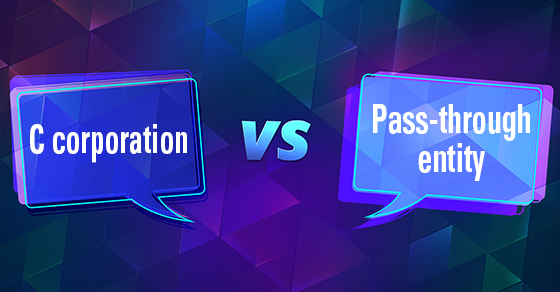Choosing the best business entity structure post-TCJA
For tax years beginning in 2018 and beyond, the Tax Cuts and Jobs Act (TCJA) created a flat 21% federal income tax rate for C corporations. Under prior law, C corporations were taxed at rates as high as 35%. The TCJA also reduced individual income tax rates, which apply to sole proprietorships and pass-through entities, including partnerships, S corporations, and, typically, limited liability companies (LLCs). The top rate, however, dropped only slightly, from 39.6% to 37%.
On the surface, that may make choosing C corporation structure seem like a no-brainer. But there are many other considerations involved.
Conventional wisdom
Under prior tax law, conventional wisdom was that most small businesses should be set up as sole proprietorships or pass-through entities to avoid the double taxation of C corporations: A C corporation pays entity-level income tax and then shareholders pay tax on dividends — and on capital gains when they sell the stock. For pass-through entities, there’s no federal income tax at the entity level.
Although C corporations are still potentially subject to double taxation under the TCJA, their new 21% tax rate helps make up for it. This issue is further complicated, however, by another provision of the TCJA that allows noncorporate owners of pass-through entities to take a deduction equal to as much as 20% of qualified business income (QBI), subject to various limits. But, unless Congress extends it, the break is available only for tax years beginning in 2018 through 2025.
There’s no one-size-fits-all answer when deciding how to structure a business. The best choice depends on your business’s unique situation and your situation as an owner.
3 common scenarios
Here are three common scenarios and the entity-choice implications:
1. Business generates tax losses. For a business that consistently generates losses, there’s no tax advantage to operating as a C corporation. Losses from C corporations can’t be deducted by their owners. A pass-through entity will generally make more sense because losses pass through to the owners’ personal tax returns.
2. Business distributes all profits to owners. For a profitable business that pays out all income to the owners, operating as a pass-through entity generally will be better if significant QBI deductions are available. If not, it’s probably a toss-up in terms of tax liability.
3. Business retains all profits to finance growth. For a business that’s profitable but holds on to its profits to fund future growth strategies, operating as a C corporation generally will be advantageous if the corporation is a qualified small business (QSB). Why? A 100% gain exclusion may be available for QSB stock sale gains. If QSB status is unavailable, operating as a C corporation is still probably preferred — unless significant QBI deductions would be available at the owner level.
Many considerations
These are only some of the issues to consider when making the C corporation vs. pass-through entity choice. We can help you evaluate your options.

